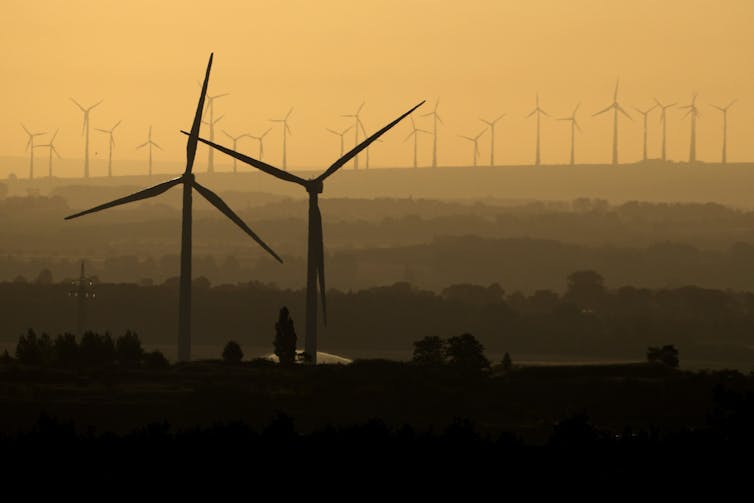CSIRO report identifies 7 ‘global megatrends’ shaping the 21st century
- Written by Stefan Hajkowicz, Senior Principal Scientist, Strategy and Foresight, Data61

Around 3.7 million Australians have been unintentionally caught in an ocean rip[1]. For the unprepared it can be a harrowing experience – but for experienced surfers[2], rips are a handy way to ride through the whitewash and out to the break.
We’re not surfers, but we work at Australia’s national science agency in “strategic foresight”, which you can think of as the study of the currents taking the world into the future. These currents are a bit like ocean rips: they present risks for those who don’t understand them, but opportunities for societies, organisations and people who are prepared.
We call the biggest currents “megatrends[3]”, and in a new report[4] we examine the megatrends that will shape the next 20 years.
From learning to live in a changing climate and shrinking our ecological footprint to navigating geopolitical earthquakes and the rise of artificial intelligence, these seven megatrends will transform many aspects of our lives over the coming decades.
Our future world
In 2012, CSIRO published a report called Our Future World[5], which delivered an evidence-based view of future megatrends to allow Australia to take early action in response.
The new report gives an update on where we’re at and where we’re going. It captures the impacts of the pandemic, among other trends and drivers.
Many of the issues we saw as possible or plausible in 2012 are now a lived reality.
Read more: What are the future megatrends all Australians need to know about?[6]
Australia, like many other countries, is grappling with flooding, bushfires and extreme heat associated with climate change. Pandemics and infectious diseases, which were a footnote in our earlier writings, have had inescapable impacts in recent times.
And the global economic restructuring we spoke of 10 years ago, mainly as an opportunity, has an increasingly important geopolitical dimension. These trends will have key implications for countries like Australia seeking to maintain peace and stability.
So, what does the future have in store?
What are the new megatrends?
The first and perhaps most concerning megatrend we identified is “adapting to climate change”. Weather-related hazards are becoming more frequent and more severe, and many communities, industries and societies are not prepared for what lies ahead.
Heatwaves in Australia[8] could be more than 85% more frequent and last up to a month if global temperatures rise between 1.5°C and 3°C. Building resilience to extreme weather events will be critical over the coming decade.
Read more: The world endured 2 extra heatwave days per decade since 1950 – but the worst is yet to come[9]
The second megatrend is what we call “leaner, cleaner and greener”: innovative solutions to meet demand for the world’s finite food, water, mineral and energy resources.
Renewable energy and low-emissions technologies, synthetic biology, alternative proteins and advanced recycling all allow us to operate within much tighter envelopes. Recent estimates[11] suggest Australia is on track to generate half its electricity from renewables by 2025.
Health at risk in a changing world
The third megatrend is “the escalating health imperative”: ageing populations, high rates of chronic illness, and a pandemic-driven surge in mental health issues are driving an unsustainable growth in healthcare spending. This spending is expected to grow faster than GDP[12] in most OECD countries over the coming decade.
Infectious disease risks associated with pandemics, outbreaks and antimicrobial drug resistance will elevate into the future. There is an urgent need for innovation in the healthcare sector to find ways to do more with less.
Read more: Remote village to metropolis: how globalisation spreads infectious diseases[13]
The fourth megatrend is “geopolitical shifts”: disrupted patterns of global trade, geopolitical tensions and growing investment in defence.
While the global economy shrunk by 3.2% in 2020, global military spend reached an all-time high[14] of A$2.9 trillion. This expenditure coincides with growing geopolitical tensions in the Asia-Pacific region.
At the same time, we have seen increased co-operation between democratic countries, including the recent expansion of the North Atlantic Treaty Organization to include Finland and Sweden.
The digital and the human
The fifth megatrend is “diving into digital”. While the digital economy has been growing rapidly for some time, the pandemic fuelled a boom in teleworking, telehealth, online retail, education and entertainment.
Around 40%[16] of Australians now work remotely on a regular basis. The digital workforce[17] is expected to increase by 79% from 2020 to 2025.
Read more: So this is how it feels when the robots come for your job: what GitHub's Copilot 'AI assistant' means for coders[18]
The sixth megatrend we identified is “increasingly autonomous”. As the capabilities of artificial intelligence (AI) have surged, it has found applications across practically all industry sectors.
AI research is taking a growing share of global research and development spending and peer-reviewed research publications[19]. These developments are opening up opportunities to boost productivity and address some of humanity’s greatest challenges.
















